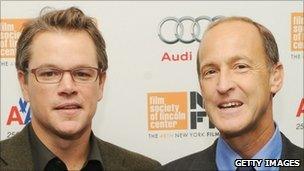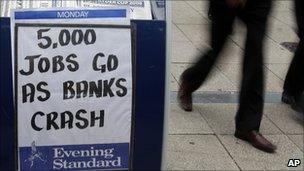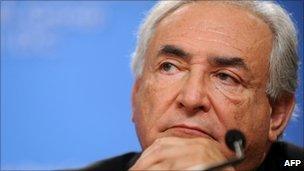Film blames financial crisis on 'inside job'
- Published

Hollywood heavyweight Matt Damon narrates Mr Ferguson's documentary
Before 2008 a two-hour movie, however well made, about the intricacies of international banking would have found a niche audience at best.
But Charles Ferguson, the American director of Inside Job, believes that two years on from the worst financial crisis in decades people are angry enough to make his film a potential hit.
What motivates him is a very American concern with accountability.
"There's not been a single criminal prosecution of anyone for their responsibility in causing these problems," he says.
"These people have not been prosecuted - and they all still have their money too".
Obvious anger
At 55 Charles Ferguson is hardly a young firebrand. He got rich consulting for high tech companies.
In the mid-90s he sold his business to Microsoft and since then has written extensively on information technology.
But in 2007 with No End in Sight: Iraq's Descent into Chaos he became an Oscar-nominated film-maker.
He feels the inside story of what happened to the US economy two years ago - and what happened internationally as a result - is at least as important.
"The essence of what happened is quite simple," he says.
"It's a heist movie - but the heist was conducted by the people running the banks rather than by people walking into the banks with guns.
"I think it's important for people to understand the role that the political system played and the role that academia played."
Charles Ferguson and the distributors Sony Pictures know that high-profile productions such as An Inconvenient Truth and Fahrenheit 9/11 uncovered a hunger for good-looking documentaries on big themes.
So Inside Job is filmed as well as many feature films, has a specially-written score, and a big-name narrator in Matt Damon.
But at heart the project's driven by Mr Ferguson's obvious anger and bafflement at a system which let his country down so badly.
'Particularly disappointing'
He says the film's for anyone, left or right, who wants to understand what happened.

Mr Ferguson says he is angry that bank bosses haven't properly accepted blame
"This is a completely bi-partisan problem in US political terms," he adds.
"It was done to us equally by Democrats and Republicans.
"The final section of the film makes the point that unfortunately President Obama appointed to run economic policy in his administration a group of people who contributed to the crisis."
Absent from the film is any spokesperson for the current administration or for the regulators. The director says it wasn't for want of trying.
Mr Ferguson says: "I asked everyone from the president on down and every single one of them said no.
"This was particularly disappointing because this is a group of people I've known personally for twenty years. I've known Larry Summers for a long time and Rahm Emanuel.
No-one in the administration would speak to me even off the record."
Despite this, Mr Ferguson can boast an impressive cast-list - though some such as Glenn Hubbard (once chief economic adviser at the White House) and Professor Frederic Mishkin of Columbia Business School seem soon to regret agreeing to face his dogged interviewing style.
'No guilt'
Mr Ferguson displays an almost Puritan outrage at the failure to apologise for - or in some cases even acknowledge - what has gone wrong.

Mr Ferguson says Dominique Strauss-Kahn also confirmed banks had yet to express regret
"American banking is very much in denial," he says.
"Even in my private and off-the-record conversations with financial executives I've not encountered a single honest expression of remorse or shame or guilt.
"I raised this too with Dominique Strauss-Kahn at the IMF [International Monetary Fund] and with the French finance minister Christine Lagarde - they both agreed that they've yet to hear any expression of regret."
"Those responsible blame 'the system'. Or they blame the bubble caused by irresponsible borrowers.
"Some of them blame low interest rates. In a grim way it's actually amusing to watch them blame anyone except themselves."
Inside Job has already been praised by critics in the US. It opens in the UK in the new year, but this week it was dropped into the London Film Festival at the last moment.
As he hurried off to the London screening I asked Charles Ferguson what the most important lesson is in his film.
"Oh that's simple. That finance is too important to be left to the financiers."
- Published2 June 2010